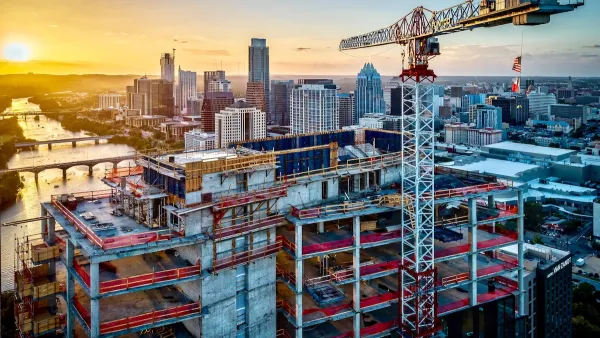A relatively few number of new units are being built as a result of new laws aimed at boosting the housing supply.

A spate of California laws aimed at increasing the housing supply have had “limited to no impact,” according to an analysis by advocacy group YIMBY Law.
Despite several new laws that allow new types of residential construction and conversion, a combination of factors — including local opposition from NIMBY groups, high labor costs, and affordability mandates that limit developers’ profits — has kept hew housing production to a minimum, reports Ben Christopher in CALmatters.
Sky high interest rates, chronic shortages of construction workers and high material costs (all of which could be exacerbated by current or expected changes to federal tariff, immigration and fiscal policy) all work to make residential housing development a less appealing financial proposition. Insufficient public funds and expected cuts to federal housing programs may weigh down on the affordable housing sector too.
One exception to the rule: accessory dwelling units are growing in number after the state permitted them, with 28,000 ADU permits issued in 2023. This law, experts say, took about five years of retooling before it became effective. Cities used strategies such as offering pre-approved ADU plans to lower the cost of construction and streamline permitting for homeowners.
FULL STORY: ‘Limited to no impact’: Why a pro-housing group says California’s pro-housing laws aren’t producing more

Maui's Vacation Rental Debate Turns Ugly
Verbal attacks, misinformation campaigns and fistfights plague a high-stakes debate to convert thousands of vacation rentals into long-term housing.

Planetizen Federal Action Tracker
A weekly monitor of how Trump’s orders and actions are impacting planners and planning in America.

San Francisco Suspends Traffic Calming Amidst Record Deaths
Citing “a challenging fiscal landscape,” the city will cease the program on the heels of 42 traffic deaths, including 24 pedestrians.

Defunct Pittsburgh Power Plant to Become Residential Tower
A decommissioned steam heat plant will be redeveloped into almost 100 affordable housing units.

Trump Prompts Restructuring of Transportation Research Board in “Unprecedented Overreach”
The TRB has eliminated more than half of its committees including those focused on climate, equity, and cities.

Amtrak Rolls Out New Orleans to Alabama “Mardi Gras” Train
The new service will operate morning and evening departures between Mobile and New Orleans.
Urban Design for Planners 1: Software Tools
This six-course series explores essential urban design concepts using open source software and equips planners with the tools they need to participate fully in the urban design process.
Planning for Universal Design
Learn the tools for implementing Universal Design in planning regulations.
Heyer Gruel & Associates PA
JM Goldson LLC
Custer County Colorado
City of Camden Redevelopment Agency
City of Astoria
Transportation Research & Education Center (TREC) at Portland State University
Jefferson Parish Government
Camden Redevelopment Agency
City of Claremont





























